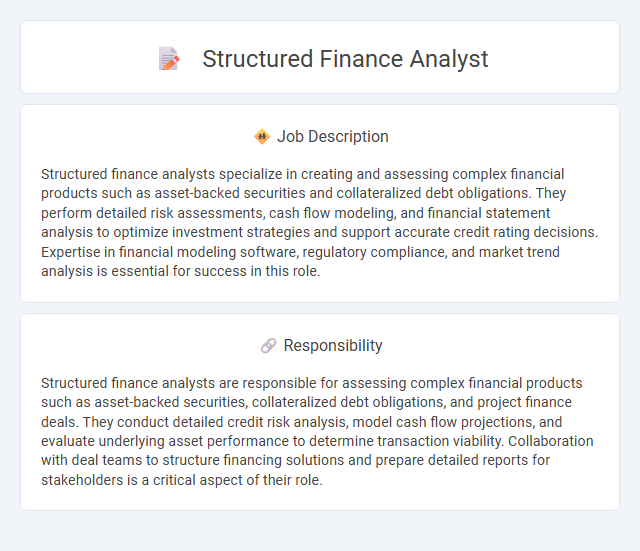
Structured finance analysts specialize in creating and assessing complex financial products such as asset-backed securities and collateralized debt obligations. They perform detailed risk assessments, cash flow modeling, and financial statement analysis to optimize investment strategies and support accurate credit rating decisions. Expertise in financial modeling software, regulatory compliance, and market trend analysis is essential for success in this role.
Individuals with strong analytical skills, attention to detail, and a solid understanding of financial instruments are likely to be well-suited for a Structured Finance Analyst role. Those comfortable managing complex data, working under pressure, and collaborating with diverse teams may find this job aligns with their capabilities. Candidates lacking quantitative aptitude or facing difficulty in fast-paced, detail-oriented environments might struggle to adapt effectively to this position.
Qualification
A Structured Finance Analyst requires strong quantitative skills, proficiency in financial modeling, and expertise in credit risk assessment. A bachelor's degree in finance, economics, or related fields is essential, with advanced certifications like CFA or CPA preferred. Experience in analyzing asset-backed securities, collateralized debt obligations, and cash flow modeling enhances job performance.
Responsibility
Structured finance analysts are responsible for assessing complex financial products such as asset-backed securities, collateralized debt obligations, and project finance deals. They conduct detailed credit risk analysis, model cash flow projections, and evaluate underlying asset performance to determine transaction viability. Collaboration with deal teams to structure financing solutions and prepare detailed reports for stakeholders is a critical aspect of their role.
Benefit
A Structured Finance Analyst role likely offers significant benefits such as gaining in-depth expertise in complex financial instruments and risk assessment, which can enhance career advancement prospects. Exposure to diverse transactions may improve analytical and problem-solving skills, potentially increasing marketability in the finance industry. The position might also provide competitive compensation and opportunities for professional networking within high-profile financial sectors.
Challenge
Structured finance analyst roles likely present complex financial modeling challenges that require advanced quantitative skills and attention to detail. Analysts may often face the probability of navigating intricate debt structures and assessing risk under uncertain market conditions. Mastery in interpreting diverse financial instruments is expected to manage and mitigate potential risks effectively.
Career Advancement
Structured finance analysts gain expertise in complex financial instruments, enabling progression to senior analyst or associate roles within investment banks and asset management firms. Mastery of credit risk assessment and deal structuring paves the way for positions such as portfolio manager or capital markets specialist. Continuous development in financial modeling and regulatory knowledge enhances prospects for leadership roles in structured finance and corporate finance divisions.
 kuljobs.com
kuljobs.com